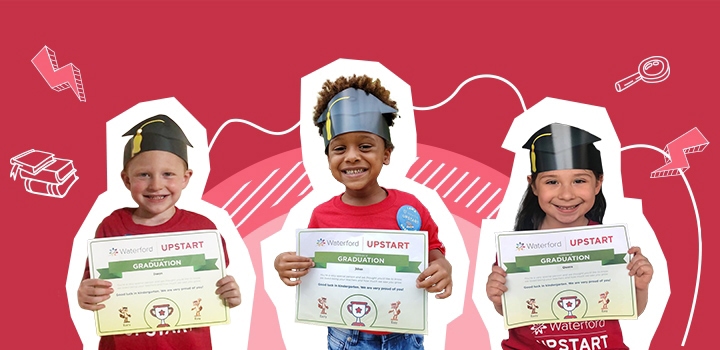When does the program start?
Programs usually begin in September and end in May to align with the traditional school year. Summer programs typically run from June through August.
What do I need to do to get started?
To get started, complete the registration form.
Once you complete your registration and are accepted into the program, check your email for instructions on the next steps. You’ll need to do a few things, such as complete Parent/Caregiver Orientation, before your child can start
How long does Waterford Upstart last?
Most Waterford Upstart programs match the timeframe of a typical school year (September to May). Some programs may also run through the summer.
How much time is my child expected to spend on the program?
Children see the most growth from the program when they use it at least 15 minutes a day, 5 days a week. With consistent usage, children build a solid reading foundation that sets them up for success in school.
Learn more about how consistent exposure to the software (Spanish version) leads to an amazing Waterford Upstart experience and great preparation for kindergarten.
What are the terms of participation?
When you register for Waterford Upstart, you’re asked to commit to:
- Complete the Parent/Caregiver Orientation online
- Help your child use the software consistently
- Communicate with us regularly
There is also an end-user license agreement (EULA) that participants must agree to. Participants who receive a computer or internet access as part of their participation must also agree to terms related to appropriate use of equipment.
How will the Waterford Upstart team communicate with me?
You will receive regular calls, texts, emails, and/or virtual event invitations so you have the support you need to prepare your child for kindergarten.
How much support do I need to give my child while they use the program?
In the beginning, your child will need some help to learn how to use the program independently. You’ll be amazed how quickly they can use it on their own.
When using the program, let your child answer the questions on their own. That way, the Waterford Upstart software can assign lessons personalized to what your child is ready to learn.
If your child is stuck during an activity, suggest that they pick their best guess or favorite answer. Do not give them the correct answer or any hints.
How can I best support my child?
With everything that Waterford Upstart provides, you’ll have many resources to support your child. Your coach can offer ideas for creating a routine, using resources available in the program, and working with your child to help them do their best.
You can check your child’s progress and daily usage by going to upstart.waterford.org* and checking the Dashboard tab. You can find digital books and ideas for activities you can do with your child in the Resources & Activities tab.
*If your child uses Waterford as part of a school program, you may need to log in at mentor.waterford.org.

